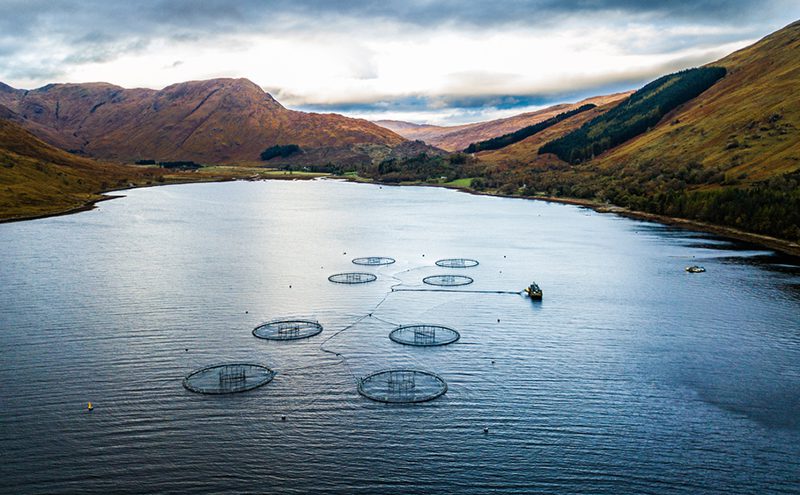
- Independent review of SEPA Fish Farm Survey Report – ‘Evaluation of a New Seabed Monitoring Approach to Investigate the Impacts of Marine Cage Fish Farms’ published in international journal, ‘Science of the Total Environment’.
- Technical analysis has undergone a peer review process which confirms the scientific robustness of SEPA’s survey results into impact of fish farm medicines Emamectin Benzoate and Teflubenzuron.
- Published in November 2018, The Fish Farm Survey added to the weight of scientific evidence on fish farm medicine use in concluding that the existing standards for medicine did not adequately protect marine life.
Detailed analysis produced by the Scottish Environment Protection Agency (SEPA) into the impact of fish farm medicines on Scotland’s seabed has been validated by environmental experts and accepted for publication in the multi-disciplinary, international journal, Science of the Total Environment.
The technical analysis from SEPA’s Fish Farm Survey is presented in a paper titled ‘Negative effects of the sea lice therapeutant emamectin benzoate at low concentrations on benthic communities around Scottish fish farms’.
The culmination of over two years’ work, SEPA’s Fish Farm Survey Report – ‘Evaluation of a New Seabed Monitoring Approach to Investigate the Impacts of Marine Cage Fish Farms’, undertaken by specialist marine scientists using research vessel the Sir John Murray, was published in November 2018 as part of a series of firm, evidence-based proposals for a revised regulatory regime.
The survey focussed on the environmental impacts from eight Scottish fish farm sites and examined 302 chemical samples from 93 sample stations and 296 ecological samples from across 142 sample stations, to assess the scale and impact of fish farm medicines, Emamectin Benzoate (EmBz) and Teflubenzuron (Tef), which was last used in 2013.
Chemical analysis found the medicines were detected in 98% and 46% of samples respectively, with residues more widely spread and more persistent in the environment around fish farms than had previously been established. Moreover, the research concluded that the impacts of individual farms may not be contained to the vicinity of farms or their licenced environmental footprint.
The UK Technical Advisory Group (UK TAG), a partnership of the UK environment and conservation agencies, is in the process of developing its recommendations on new environmental standards for Emamectin Benzoate to the Scottish Government. Results from the survey were provided to UK TAG as part of their considerations and in the interim, SEPA has adopted a precautionary principle position which imposes a much tighter interim standard for the use of Emamectin Benzoate at any new site.
Dr David Pirie, Executive Director for Evidence and Flooding at the Scottish Environment Protection Agency, said:
“Every day, SEPA works to protect and enhance Scotland’s environment and as an evidence based organisation, we are clear that sound environmental science is the foundation on which we build our key regulatory standards.
“By submitting the statistical analysis of our survey for rigorous peer review by leading environmental scientists, it confirms the robustness of SEPA’s scientific approach and reinforces the validity of our findings that the existing standards were not adequate for protecting marine life.”
Reviewed and co-authored by Biomathematics and Statistics Scotland (BioSS), expert statisticians provided specialist guidance on SEPA’s scientific methods and facilitated the development of an improved, robust approach to the analysis of the survey’s data.
Dr Katharine Preedy, a senior statistician within BioSS, said:
“Marine environments have complex interactions and human activity can affect many different aspects of the system.
“Open communication and collaboration between specialists in very different areas of science are therefore crucial to establishing a robust body of evidence upon which to base decisions about measures to protect marine life.”
Published in November 2018, the Fish Farm Survey report formed a core element of SEPA’s proposals for a revised regime that will strengthen environmental regulation of the Finfish Aquaculture sector. Recognising the diverse range of views of finfish aquaculture, SEPA announced a seven-week public consultation incorporating a series of nine consultation events across Scotland during November and December where a broad range of stakeholders engaged directly with specialist teams from the agency. In total, 275 people and 31 stakeholder groups attended. SEPA will shortly announce the agency’s next steps in its regulatory regime.
SEPA’s technical analysis is open to the public and free to download for review, directly from Science of the Total Environment.







